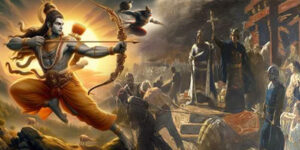Navratri (“nava” + “ratri”) literally means “nine nights”. This ritual is observed twice a year, in spring and in autumn. “Vasant Navratri” is nine days of fast and worship that Hindus undertake during spring every year. Vasant Navratri is also known as “Ram Navratri” because Ram Navami falls on the ninth day of Chaitra month.
The scriptures say, “I bow again and again before Maa Jagadambaa (Mother of the universe), abiding in all beings and objects in the form of energy.”
Divinity manifests in numerous shapes and forms. One of them is that of the Mother. The manifestation of Supreme Brahman in the form of power, compassion, forgiveness, and benevolence has been termed as Maa (Mother), and Navratri is the time to adore and worship the Mother in her various forms. The Mother’s Grace is boundless. Her mercy is illimitable, Her knowledge infinite; Her power is immeasurable, Her glory ineffable and Her splendor indescribable. She gives us material prosperity as well as spiritual freedom.
In the ‘Srimad Devi Bhagawat’, it is written that one desirous of knowledge, wealth and begetting a son should meticulously observe the Navratri Vrat, which has the power of returning the kingdom to a dethroned king. Shri Rama worshipped Durga at the time of the fight with Ravana, to invoke Her aid in the war. He fought and won through Her Grace. It was also on this day that Arjuna worshipped Devi, before starting the battle against the Kauravas on the field of Kurukshetra.
Origin of Vasanta Navaratri
 In days long gone by, King Dhruvasindu was killed by a lion when he went out hunting. Preparations were made to crown the prince Sudarsana. But, King Yudhajit of Ujjain, the father of Queen Lilavati, and King Virasena of Kalinga, the father of Queen Manorama, were each desirous of securing the Kosala throne for their respective grandsons. They fought with each other. King Virasena was killed in the battle. Manorama fled to the forest with Prince Sudarsana and a eunuch. They took refuge in the hermitage of Rishi Bharadwaja.
In days long gone by, King Dhruvasindu was killed by a lion when he went out hunting. Preparations were made to crown the prince Sudarsana. But, King Yudhajit of Ujjain, the father of Queen Lilavati, and King Virasena of Kalinga, the father of Queen Manorama, were each desirous of securing the Kosala throne for their respective grandsons. They fought with each other. King Virasena was killed in the battle. Manorama fled to the forest with Prince Sudarsana and a eunuch. They took refuge in the hermitage of Rishi Bharadwaja.
The victor, King Yudhajit, thereupon crowned his grandson, Satrujit, at Ayodhya, the capital of Kosala. He then went out in search of Manorama and her son. The Rishi said that he would not give up those who had sought protection under him. Yudhajit became furious. He wanted to attack the Rishi. But, his minister told him about the truth of the Rishi’s statement. Yudhajit returned to his capital.
Fortune smiled on Prince Sudarsana. A hermit’s son came one day and called the eunuch by his Sanskrit name Kleeba. The prince caught the first syllable Kli and began to pronounce it as Kleem. This syllable happened to be a powerful, sacred Mantra. It is the Bija Akshara (root syllable) of the Divine Mother. The Prince obtained peace of mind and the Grace of the Divine Mother by the repeated utterance of this syllable. Devi appeared to him, blessed him and granted him divine weapons and an inexhaustible quiver.
The emissaries of the king of Benares passed through the Ashram of the Rishi and, when they saw the noble prince Sudarsana, they recommended him to Princess Sashikala, the daughter of the king of Benares.
The ceremony at which the princess was to choose her spouse was arranged. Sashikala at once chose Sudarsana. They were duly wedded. King Yudhajit, who had been present at the function, began to fight with the king of Benares. Devi helped Sudarsana and his father-in-law. Yudhajit mocked Her, upon which Devi promptly reduced Yudhajit and his army to ashes.
Thus Sudarsana, with his wife and his father-in-law, praised Devi. She was highly pleased and ordered them to perform Her worship with havan and other means during the Vasanta Navaratri. Then She disappeared.
Prince Sudarsana and Sashikala returned to the Ashram of Rishi Bharadwaja. The great Rishi blessed them and crowned Sudarsana as the king of Kosala. Sudarsana and Sashikala and the king of Benares implicitly carried out the commands of the Divine Mother and performed worship in a splendid manner during the Vasanta Navaratri.
Sudarsana’s descendants, namely, Sri Rama and Lakshmana, also performed worship of Devi during the Vasanta Navaratri and were blessed with Her assistance in the recovery of Sita.
Why Celebrate Vasanta Navaratri?
It is the duty of the devout Hindus to worship the Devi (Mother Goddess) for both material and spiritual welfare during the Vasanta Navaratri and follow the noble example set by Sudarsana and Sri Rama. He cannot achieve anything without the Divine Mother’s blessings. So, sing Her praise and repeat Her Mantra and Name. Meditate on Her form. Pray and obtain Her eternal Grace and blessings. May the Divine Mother bless you with all divine wealth!”
(Adapted from Hindu Fasts & Festivals by Sri Swami Sivananda)


























